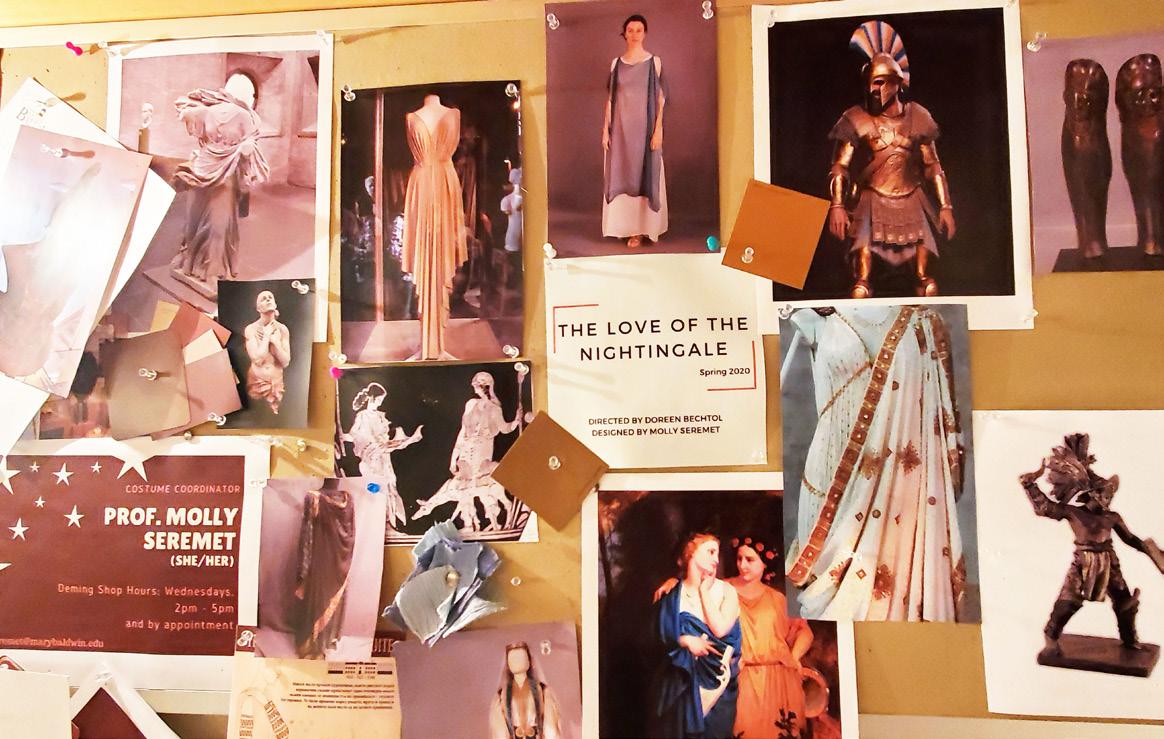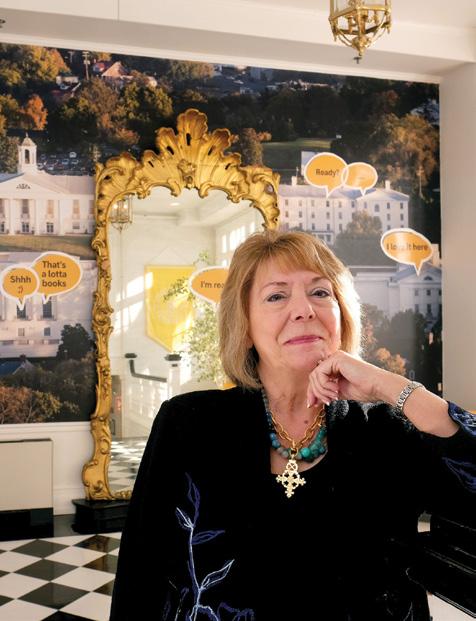
7 minute read
Valiant Efforts
Amy Swope ’07 helps working dogs find their way home from combat zones
Like members of the Class of 2020, who are homebound due to the coronavirus pandemic, Amy Swope ’07 had a graduation day that turned out very differently than she had expected.
Advertisement
At Mary Baldwin, Swope learned “perseverance and professionalism,” as she puts it, as an interior design major who mixed creativity with business sense. She especially appreciated her “Women in Business” course with Professor Claire Kent, and the art critiques she experienced in Professor Beth Young’s class.
“In Professor Kent’s class, I felt like I got the professional armor I needed to take on my first job, and Professor Young taught me how to not give up and keep going after a tough critique. I learned that the real world will be hard sometimes, especially when you’re committing to something you care about.”
Alongside her studies, Swope participated in ROTC at Mary Baldwin and served in the Staunton-based unit of the Army National Guard as an E4 specialist. She had grown up in Augusta County, and many of her fellow guard soldiers were friends she knew from high school and from playing on local sports teams.
On the very same week as her Commencement ceremony, her unit was deployed to Baghdad as part of the U.S. troops’ surge strategy in the Iraq War.
“It was mayhem. I couldn’t even walk across the stage. My unit gave me the option of staying home, and I said, ‘No, I’ve been with you guys for five years, and you aren’t going without me.’ Mary Baldwin let my parents get my diploma for me, and I went with my unit.”
Earning their college diploma often puts young men and women at a crossroads in their lives. For Swope, her year-long tour of duty in Iraq became a bridge — both to her future career and her future calling.
“I’ve always been a driven person, but my service focused that part of me into a drive to be what is really important in the world, to be what the world needs. Service in the military peels away all the layers of things that aren’t as important in life and lets you realize where you can really be of service.”
Swope served as a chaplain’s assistant while deployed, and most of her days were spent in a combat hospital, helping soldiers struggling with times of war. But it was her off-duty hours that led to her next chapter.
“I lived right next to the K9 building in the embassy area of Baghdad. It was kind-of loud, but fun. My chaplain assistant duties were very emotionally draining, so when I was off, I would go help out at the kennel and spend time with the dogs, throwing balls and playing with them.”
It was there that she met representatives from contract companies who were recruiting people to do K9 work in locations all around the world. (The Department of Defense contracts with these private companies, which select and train contract working dogs to fulfill different roles in embassies or U.S. Aid locations, often in combat zones. The U.S. Military runs a similar program in which military working dogs are trained specifically for service in the field.) One company was impressed with her dedication to the dogs and offered her the chance to become a contracted K9 handler and trainer.
These contract working dogs are not ordinary, and neither is the work they carry out. Most come out of breeding programs in Europe and are selected for their extreme level of drive and their nerve strength.
“Nerve strength is what it takes for a dog to keep going after a bomb goes off, for example. And drive is their work ethic, when all a dog wants to do is go, go, go. I’m estimating here, but maybe out of 2,000 dogs, 20 might get selected for this work. It’s a very specific selection process.”
When they’re emotionally mature, the dogs start training — a process which can take 6 months to a year to complete — for different jobs including explosives detection, narcotics detection, and searching for buried explosives like mines or unexploded ordnance. There are some dogs who are trained specifically to work off leash searching for improvised explosive devices (IEDs).
In her first position, Swope went to South Africa to train contract working dogs who were then assigned missions around the world. Trainers expose dogs to a lot of experiences and scenarios to see how they will react.
“It was amazing, because I got to train green dogs and build them up from a basic state to a deployable state. It was the best first experience because I worked with about 200 dogs and got to see so many different things with so many different dogs. It helped me understand behavioral personalities.”
When Swope was ready for a change after working for contract companies for eight years, she once again found inspiration in these special dogs. As her years of service came to an end, she also wanted to help those animals who were ready to retire.
Most contract working dogs serve about six years, starting when they’re about 2 years old until they’re 8 or sometimes 10. The military is required to bring dogs back to the United States, but things can get complicated with contract companies. Nonprofits like Mission K9 Rescue have stepped in to ensure that these dogs are taken care of after their work is done.
Swope has joined those efforts, founding her own nonprofit, World Animal Guardians, that takes in retired working dogs, among other dogs in need of rescue, and helps rehabilitate them so they can reintegrate into society. Working under intense stress and in dangerous environments for years at a time, these dogs need help learning how to settle down from a state of high alert and often deal with issues such as post-traumatic stress disorder and separation anxiety. Swope has taken in about 100 rescue dogs at her kennel business, Blue Ridge Canine Services, where she works to find them new homes with adoptive families when they’re ready.
World Animal Guardians, the nonprofit Swope founded, has saved more than 250 dogs total, some of whom go directly to foster homes. It primarily helps Americans who are living and working abroad bring their rescued street animals from foreign countries back to the United States.
“Working for the Department of Defense abroad showed me the vast mistreatment of animals worldwide, and while so many people want to help them, the logistics can be daunting. My boarding kennel, Blue Ridge Canine Services, boards for many rescue groups such as Mission K9 Rescue and Puppy Rescue Mission — we all have like-minded and similar missions.”
The spirit of Swope’s calling is especially captured in the story of K9 Koni. She met Koni while working as a kennel master in Kuwait where dogs were tasked to protect American interests in oil wells.
“Koni was a really young malinois, and she just wasn’t cut out to do work, because she was too soft-natured. Since she wasn’t working and was just hanging around the kennel, I wondered if she could be retired.”
It took five years for the contract company to release Koni, thanks to Swope’s efforts and those of Mission K9 Rescue. When Koni arrived back in the United States, Mission K9 Rescue surprised Swope and reunited her with Koni, thinking that Swope could help place her in a home through her non-profit. But when Swope sent a picture of Koni from her Kuwaiti days to her parents, they said, “We want that dog, that’s our dog,” and adopted her.
“I think that was my biggest win, and I still get to see her all the time.”
Finding creative solutions to a problem. Approaching business with a sense of purpose and compassion. Refining techniques through practice, training, and experimentation. Although Swope hasn’t pursued the career that exactly matched her interior design major after college, the skills she honed at Mary Baldwin have helped improve many lives, both canine and human.
“I didn’t end up doing what I thought I would do. I thought I would work in a big design firm somewhere, but life took its own path. Mary Baldwin’s contribution was that it set me up for leadership. I ended up founding a nonprofit and a business, and that came out of the atmosphere of the college and what they fostered in me.”
And for the members of the Class of 2020 who are entering a world full of great uncertainty after graduation, Swope reminds them to hold true to what they have learned and what they love to do.
“Know that overall college is setting you up with life skills that will help you succeed on any path you choose.”










